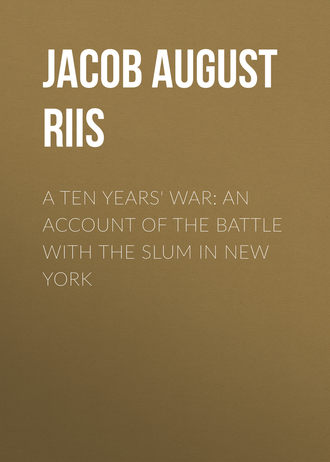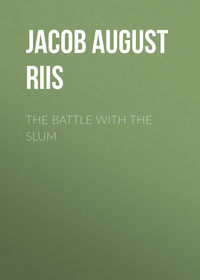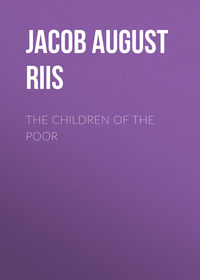 полная версия
полная версияA Ten Years' War: An Account of the Battle with the Slum in New York
A year later, I passed that same way on the night of election. The scene was strangely changed. The street was unusually quiet for such a time. Men stood in groups about the saloons, and talked in whispers, with serious faces. The name of Roosevelt was heard on every hand. The dives were running, but there was no shouting, and violence was discouraged. When, on the following day, I met the proprietor of one of the oldest concerns in the Bowery,—which, while doing a legitimate business, caters necessarily to its crowds, and therefore sides with them,—he told me with bitter reproach how he had been stricken in pocket. A gambler had just been in to see him, who had come on from the far West, in anticipation of a wide-open town, and had got all ready to open a house in the Tenderloin. "He brought $40,000 to put in the business, and he came to take it away to Baltimore. Just now the cashier of – Bank told me that two other gentlemen—gamblers? yes, that's what you call them—had drawn $130,000 which they would have invested here, and had gone after him. Think of all that money gone to Baltimore! That's what you've done!"
I went over to police headquarters, thinking of the sad state of that man, and in the hallway I ran across two children, little tots, who were inquiring their way to "the commissioner." The older was a hunchback girl, who led her younger brother (he could not have been over five or six years old) by the hand. They explained their case to me. They came from Allen Street. Some undesirable women tenants had moved into the tenement, and when complaint was made that sent the police there, the children's father, who was a poor Jewish tailor, was blamed. The tenants took it out of the boy by punching his nose till it bled. Whereupon the children went straight to Mulberry Street to see the commissioner and get justice. It was the first time in twenty years that I had known Allen Street to come to police headquarters for justice; and in the discovery that the new idea had reached down to the little children I read the doom of the slum, despite its loud vauntings.
No, it was not true that reform was dead, with decency. It was not the slum that had won; it was we who had lost. We were not up to the mark,—not yet. But New York is a many times cleaner and better city to-day than it was ten years ago. Then I was able to grasp easily the whole plan for wresting it from the neglect and indifference that had put us where we were. It was chiefly, almost wholly, remedial in its scope. Now it is preventive, constructive, and no ten men could gather all the threads and hold them. We have made, are making headway, and no Tammany has the power to stop us. She knows it, too, and is in such frantic haste to fill her pockets while she has time that she has abandoned her old ally, the tax rate, and the pretense of making bad government cheap government. She is at this moment engaged in raising taxes and assessments at one and the same time to an unheard-of figure, while salaries are being increased lavishly on every hand. We can afford to pay all she charges us for the lesson we are learning. If to that we add common sense, we shall discover the bearings of it all without trouble. Yesterday I picked up a book,—a learned disquisition on government,—and read on the title-page, "Affectionately dedicated to all who despise politics." That was not common sense. To win the battle with the slum, we must not begin by despising politics. We have been doing that too long. The politics of the slum is apt to be like the slum itself, dirty. Then it must be cleaned. It is what the fight is about. Politics is the weapon. We must learn to use it so as to cut straight and sure. That is common sense, and the golden rule as applied to Tammany.
Some years ago, the United States government conducted an inquiry into the slums of great cities. To its staff of experts was attached a chemist, who gathered and isolated a lot of bacilli with fearsome Latin names, in the tenements where he went. Among those he labeled were the Staphylococcus pyogenes albus, the Micrococcus fervidosus, the Saccharomyces rosaceus, and the Bacillus buccalis fortuitus. I made a note of the names at the time, because of the dread with which they inspired me. But I searched the collection in vain for the real bacillus of the slum. It escaped science, to be identified by human sympathy and a conscience-stricken community with that of ordinary human selfishness. The antitoxin has been found, and is applied successfully. Since justice has replaced charity on the prescription the patient is improving. And the improvement is not confined to him; it is general. Conscience is not a local issue in our day. A few years ago, a United States Senator sought reëlection on the platform that the decalogue and the golden rule were glittering generalities that had no place in politics, and lost. We have not quite reached the millennium yet, but to-day a man is governor in the Empire State who was elected on the pledge that he would rule by the ten commandments. These are facts that mean much or little, according to the way one looks at them. The significant thing is that they are facts, and that, in spite of slipping and sliding, the world moves forward, not backward. The poor we shall have always with us, but the slum we need not have. These two do not rightfully belong together. Their present partnership is at once poverty's worst hardship and our worst fault.
II
THE TENEMENT HOUSE BLIGHT
In a Stanton Street tenement, the other day, I stumbled upon a Polish capmaker's home. There were other capmakers in the house, Russian and Polish, but they simply "lived" there. This one had a home. The fact proclaimed itself the moment the door was opened, in spite of the darkness. The rooms were in the rear, gloomy with the twilight of the tenement, although the day was sunny without, but neat, even cosy. It was early, but the day's chores were evidently done. The teakettle sang on the stove, at which a bright-looking girl of twelve, with a pale but cheery face, and sleeves brushed back to the elbows, was busy poking up the fire. A little boy stood by the window, flattening his nose against the pane and gazing wistfully up among the chimney pots where a piece of blue sky about as big as the kitchen could be made out. I remarked to the mother that they were nice rooms.
"Ah yes," she said, with a weary little smile that struggled bravely with hope long deferred, "but it is hard to make a home here. We would so like to live in the front, but we can't pay the rent."
I knew the front with its unlovely view of the tenement street too well, and I said a good word for the air shaft—yard or court it could not be called, it was too small for that—which rather surprised myself. I had found few virtues enough in it before. The girl at the stove had left off poking the fire. She broke in the moment I finished, with eager enthusiasm: "Why, they have the sun in there. When the door is opened the light comes right in your face."
"Does it never come here?" I asked, and wished I had not done so, as soon as the words were spoken. The child at the window was listening, with his whole hungry little soul in his eyes.
Yes, it did, she said. Once every summer, for a little while, it came over the houses. She knew the month and the exact hour of the day when its rays shone into their home, and just the reach of its slant on the wall. They had lived there six years. In June the sun was due. A haunting fear that the baby would ask how long it was till June—it was February then—took possession of me, and I hastened to change the subject. Warsaw was their old home. They kept a little store there, and were young and happy. Oh, it was a fine city, with parks and squares, and bridges over the beautiful river,—and grass and flowers and birds and soldiers, put in the girl breathlessly. She remembered. But the children kept coming, and they went across the sea to give them a better chance. Father made fifteen dollars a week, much money; but there were long seasons when there was no work. She, the mother, was never very well here,—she hadn't any strength; and the baby! She glanced at his grave white face, and took him in her arms. The picture of the two, and of the pale-faced girl longing back to the fields and the sunlight, in their prison of gloom and gray walls, haunts me yet. I have not had the courage to go back since. I recalled the report of an English army surgeon, which I read years ago, on the many more soldiers that died—were killed would be more correct—in barracks into which the sun never shone than in those that were open to the light.
The capmaker's case is the case of the nineteenth century, of civilization, against the metropolis of America. The home, the family, are the rallying points of civilization. But long since the tenements of New York earned for it the ominous name of "the homeless city." In its 40,000 tenements its workers, more than half of the city's population, are housed. They have no other chance. There are, indeed, wives and mothers who, by sheer force of character, rise above their environment and make homes where they go. Happily, there are yet many of them. But the fact remains that hitherto their struggle has been growing ever harder, and the issue more doubtful.
The tenement itself, with its crowds, its lack of privacy, is the greatest destroyer of individuality, of character. As its numbers increase, so does "the element that becomes criminal for lack of individuality and the self-respect that comes with it." Add the shiftless and the weak who are turned out by the same process, and you have its legitimate crop. In 1880 the average number of persons to each dwelling in New York was 16.37; in 1890 it was 18.52. In 1895, according to the police census, 21.2. The census of 1900 will show the crowding to have gone on at an equal if not at a greater rate. That will mean that so many more tenements have been built of the modern type, with four families to the floor where once there were two. I shall not weary the reader with many statistics. They are to be found, by those who want them, in the census books and in the official records. I shall try to draw from them their human story. But, as an instance of the unchecked drift, let me quote here the case of the Tenth Ward, that East Side district known as the most crowded in all the world. In 1880, when it had not yet attained that bad eminence, it contained 47,554 persons, or 432.3 to the acre. In 1890 the census showed a population of 57,596, which was 522 to the acre. The police census of 1895 found 70,168 persons living in 1514 houses, which was 643.08 to the acre. Lastly, the Health Department's census for the first half of 1898 gave a total of 82,175 persons living in 1201 tenements, with 313 inhabited buildings yet to be heard from. This is the process of doubling up,—literally, since the cause and the vehicle of it all is the double-decker tenement,—which in the year 1895 had crowded a single block in that ward at the rate of 1526 persons per acre, and one in the Eleventh Ward at the rate of 1774.1 It goes on not in the Tenth Ward or on the East Side only, but throughout the city. When, in 1897, it was proposed to lay out a small park in the Twenty-Second Ward, up on the far West Side, it was shown that five blocks in that section, between Forty-Ninth and Sixty-Second streets and Ninth and Eleventh avenues, had a population of more than 3000 each. The block between Sixty-First and Sixty-Second streets, Tenth and Eleventh avenues, harbored 3580, which meant 974.6 persons to the acre.
If we have here to do with forces that are beyond the control of the individual or the community, we shall do well at least to face the facts squarely and know the truth. It is no answer to the charge that New York's way of housing its workers is the worst in the world to say that they are better off than they were where they came from. It is not true, in most cases, as far as the home is concerned: a shanty is better than a flat in a cheap tenement, any day. Even if it were true, it would still be beside the issue. In Poland my capmaker counted for nothing. Nothing was expected of him. Here he ranks, after a few brief years, politically equal with the man who hires his labor. A citizen's duty is expected of him, and home and citizenship are convertible terms. The observation of the Frenchman who had watched the experiment of herding two thousand human beings in eight tenement barracks in Paris, that the result was the "exasperation of the tenant against society," is true the world over. We have done as badly in New York. Social hatefulness is not a good soil for citizenship to grow in, where political equality rules.
Nor will the old lie about the tenants being wholly to blame cover the ground. It has long been overworked in defense of landlord usury. Doubtless there are bad tenants. In the matter of renting houses, as in everything else, men have a trick of coming up to what is expected of them, good or bad; but as a class the tenants have been shown all along to be superior to their surroundings. "Better than the houses they live in," said the first Tenement House Commission; and the second gave as its verdict that "they respond quickly to improved conditions." That is not an honest answer. The truth is that if we cannot check the indraught to the cities, we can, if we choose, make homes for those who come, and at a profit on the investment. Nothing has been more clearly demonstrated in our day, and it is time that it should be said so that everybody can understand. It is not a case of transforming human nature in the tenant, but of reforming it in the landlord builder. It is a plain question of the per cent. he is willing to take.
So that we may get the capmaker's view and that of his fellow tenants,—for, after all, that is the one that counts; the state and the community are not nearly so much interested in the profits of the landlord as in the welfare of the workers,—suppose we take a stroll through a tenement house neighborhood and see for ourselves. We were in Stanton Street. Let us start there, then, going east. Towering barracks on either side, five, six stories high. Teeming crowds. Push-cart men "moved on" by the policeman, who seems to exist only for the purpose. Forsyth Street: there is a church on the corner, Polish and Catholic, a combination that strikes one as queer here on the East Side, where Polish has come to be synonymous with Jewish. I have cause to remember that corner. A man killed his wife in this house, and was hanged for it. Just across the street, on the stoop of that brown stone tenement, the tragedy was reënacted the next year; only the murderer saved the county trouble and expense by taking himself off, also. That other stoop in the same row witnessed a suicide. Why do I tell you these things? Because they are true. The policeman here will bear me out. They belong to the ordinary setting of life in a crowd such as this. It is never so little worth living, and therefore held so cheap along with the fierce, unceasing battle that goes on to save it. You will go no further unless I leave it out? Very well; I shall leave out the murder after we have passed the block yonder. The tragedy of that is of a kind that comes too close to the every-day life of tenement house people to be omitted. The house caught fire in the night, and five were burned to death,—father, mother, and three children. The others got out; why not they? They stayed, it seems, to make sure none was left; they were not willing to leave one behind, to save themselves. And then it was too late; the stairs were burning. There was no proper fire escape. That was where the murder came in; but it was not all chargeable to the landlord, nor even the greater part. More than thirty years ago, in 1867, the state made it law that the stairs in every tenement four stories high should be fireproof, and forbade the storing of any inflammable material in such houses. I do not know when the law was repealed, or if it ever was. I only know that in 1892 the Fire Department, out of pity for the tenants and regard for the safety of its own men, forced through an amendment to the building law, requiring the stairs of the common type of five-story tenements to be built of fireproof material, and that to-day they are of wood, just as they always were. Only last spring I looked up the Superintendent of Buildings and asked him what it meant. I showed him the law, which said that the stairs should be "built of slow-burning construction or fireproof material;" and he put his finger upon the clause that follows, "as the Superintendent of Buildings shall decide." The law gave him discretion, and that is how he used it. "Hard wood burns slowly," said he.
The fire of which I speak was a "cruller fire," if I remember rightly, which is to say that it broke out in the basement bakeshop, where they were boiling crullers (doughnuts) in fat, at four A. M., with a hundred tenants asleep in the house above them. The fat went into the fire, and the rest followed. I suppose that I had to do with a hundred such fires, as a police reporter, before, under the protest of the Tenement House Committee and the Good Government Clubs, the boiling of fat in tenement bakeshops was forbidden. The chief of the Fire Department, in his testimony before the committee, said that "tenements are erected mainly with a view of returning a large income for the amount of capital invested. It is only after a fire in which great loss of life occurs that any interest whatever is taken in the safety of the occupants." The Superintendent of Buildings, after such a fire in March, 1896, said that there were thousands of tenement fire-traps in the city. My reporter's notebook bears witness to the correctness of his statement, and it has many blank leaves that are waiting to be put to that use yet. The reckoning for eleven years showed that, of 35,844 fires in New York, 53.18 per cent. were in tenement houses, though they were only a little more than 31 per cent. of all the buildings, and that 177 occupants were killed, 523 maimed, and 625 rescued by the firemen. Their rescue cost the lives of three of these brave men, and 453 were injured in the effort. And when all that is said, not the half is told. A fire in the night in one of those human beehives, with its terror and woe, is one of the things that live in the recollection ever after as a terrible nightmare. Yet the demonstration of the Tenement House Committee, that to build tenements fireproof from the ground up would cost little over ten per cent. more than is spent upon the firetrap, and would more than return the interest on the extra outlay in the saving of insurance and repairs, and in the better building every way, has found no echo in legislation or in the practice of builders. That was the fire chief's way to avoid "the great destruction of life;" but he warned the committee that it would "meet with strong opposition from the different interests, should legislation be requested." The interest of the man who pays the rent will not be suspected in this, so he must have meant the man who collects it.
Here is a block of tenements inhabited by poor Jews. Most of the Jews who live over here are poor; and the poorer they are, the higher rent do they pay, and the more do they crowd to make it up between them. "The destruction of the poor is their poverty." It is only the old story in a new setting. The slum landlord's profits were always the highest. He spends nothing for repairs, and lays the blame on the tenant. The "district leader" saves him, in these days of Tammany rule come back, unless he is on the wrong side of the political fence, in which case the Sanitary Code comes handy to chase him into camp. A big "order" on his house is a very effective way of making a tenement house landlord discern political truth on the eve of an important election. Just before the last, when the election of Theodore Roosevelt was threatened, the sanitary force displayed such activity as it has not since, up to the raid on the elevated roads, in the examination of tenements belonging very largely, as it happened, to sympathizers with the gallant Rough Rider's cause; and those who knew did not marvel much at the large vote polled by the Tammany candidate in the old city.
The halls of these tenements are dark. Under the law, there should be a light burning, but it is one of the rarest things to find one. The thing seems well-nigh impossible of accomplishment. Two years ago, when the Good Government Clubs set about backing up the Board of Health in its efforts to work out this reform, which comes close to being one of the most necessary of all,—such untold mischief is abroad in the darkness of these thoroughfares,—the sanitary police reported 12,000 tenement halls unlighted by night, even, and brought them, by repeated orders, down to less than 1000 in six months. I do not believe the light burns in 1000 of them all to-day. It is so easy to put it out when the policeman's back is turned, and save the gas.
We had a curious instance at the time of the difficulties that sometimes beset reform. Certain halls that were known to be dark were reported sufficiently lighted by the policeman of the district, and it was discovered that it was his standard that was vitiated. He himself lived in a tenement, and was used to its gloom. So an order was issued defining darkness to the sanitary police: if the sink in the hall could be made out, and the slops overflowing on the floor, and if a baby could be seen on the stairs, the hall was light; if, on the other hand, the baby's shrieks were the first warning that it was being trampled upon, the hall was dark. Some days later, the old question arose about an Eldridge Street tenement. The policeman had reported the hall light enough. The president of the Board of Health, to settle it once for all, went over with me, to see for himself. The hall was very dark. He sent for the policeman.
"Did you see the sink in that hall?" he asked.
The policeman said he did.
"But it is pitch dark. How did you see it?"
"I lit a match," said the policeman.
Four families live on these floors, with Heaven knows how many children. It was here the police commissioners were requested, in sober earnest, some years ago, by a committee of very practical women philanthropists, to have the children tagged, so as to save the policemen wear and tear in taking them back and forth between the Eldridge Street police station and headquarters, when they got lost. If tagged, they could be assorted at once and taken to their homes. Incidentally, the city would save the expense of many meals. It was shrewdly suspected that the little ones were lost on purpose in a good many cases, as a way of getting them fed at the public expense.
That the children preferred the excitement of the police station, and the distinction of a trip in charge of a brass-buttoned guardian, to the Ludlow Street flat is easy enough to understand. A more unlovely existence than that in one of these tenements it would be hard to imagine. Everywhere is the stench of the kerosene stove that is forever burning, serving for cooking, heating, and ironing alike, until the last atom of oxygen is burned out of the close air. Oil is cheaper than coal. The air shaft is too busy carrying up smells from below to bring any air down, even if it is not hung full of washing in every story, as it ordinarily is. Enterprising tenants turn it to use as a refrigerator as well. There is at least a draught of air, such as it is. When fire breaks out, this draught makes of the air shaft a flue through which the fire roars fiercely to the roof, so transforming what was meant for the good of the tenants into their greatest peril. The stuffy rooms seem as if they were made for dwarfs. Most decidedly, there is not room to swing the proverbial cat in any one of them. In one I helped the children, last holiday, to set up a Christmas tree, so that a glimpse of something that was not utterly sordid and mean might for once enter their lives. Three weeks after, I found the tree standing yet in the corner. It was very cold, and there was no fire in the room. "We were going to burn it," said the little woman, whose husband was then in the insane asylum, "and then I couldn't. It looked so kind o' cheery-like there in the corner." My tree had borne the fruit I wished.
It remained for the New York slum landlord to assess the exact value of a ray of sunlight,—upon the tenant, of course. Here are two back-to-back rear tenements, with dark bedrooms on the south. The flat on the north gives upon a neighbor's yard, and a hole two feet square has been knocked in the wall, letting in air and sunlight; little enough of the latter, but what there is is carefully computed in the lease. Six dollars for this flat, six and a half for the one with the hole in the wall. Six dollars a year per ray. In half a dozen houses in this block have I found the same rate maintained. The modern tenement on the corner goes higher: for four front rooms, "where the sun comes right in your face," seventeen dollars; for the rear flat of three rooms, larger and better every other way, but always dark, like the capmaker's, eleven dollars. From the landlord's point of view, this last is probably a concession. But he is a landlord with a heart. His house is as good a one as can be built on a twenty-five-foot lot. The man who owns the corner building in Orchard Street, with the two adjoining tenements, has no heart. In the depth of last winter, I found a family of poor Jews living in a coop under his stairs, an abandoned piece of hallway, in which their baby was born, and for which he made them pay eight dollars a month. It was the most outrageous case of landlord robbery I had ever come across, and it gave me sincere pleasure to assist the sanitary policeman in curtailing his profits by even this much. The hall is not now occupied.









